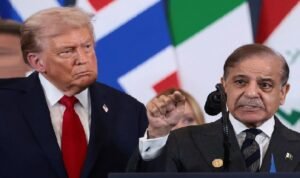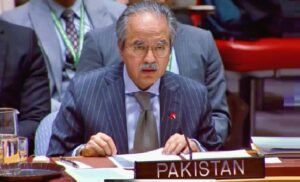25-11-2025
By SJA Jafri
ISLAMABAD: When the United Nations Security Council on Monday adopted a United States-authored resolution that paves the way for a transitional administration and an International Stabilization Force (ISF) in Gaza, Pakistan which was presiding over the council had a seemingly contradictory response.
 Asim Iftikhar Ahmed, Pakistan’s permanent representative to the UN, thanked the US for tabling the resolution and voted in its favor but he also said Pakistan was not entirely satisfied with the outcome, and warned that “some critical suggestions” from Pakistan were not included in the final text.
Asim Iftikhar Ahmed, Pakistan’s permanent representative to the UN, thanked the US for tabling the resolution and voted in its favor but he also said Pakistan was not entirely satisfied with the outcome, and warned that “some critical suggestions” from Pakistan were not included in the final text.
Though the resolution promises a “credible pathway” to Palestinian statehood, Ahmed, in his comments to the council, said it did not spell that path out, and did not clarify the role of the UN, a proposed Board of Peace (BoP) to oversee Gaza’s governance, or the mandate of the ISF.
“Those are all crucial aspects with a bearing on the success of this endeavor. We earnestly hope that further details in coming weeks will provide the much-needed clarity on these issues,” he said but the country had already endorsed US President Donald Trump’s 20-point Gaza ceasefire plan in September, the basis for the UN resolution and while several other Arab and Muslim countries have also cautiously supported the resolution, Pakistan, with the largest army among them, is widely expected to play a key role in the ISF.
The vote in favor of the resolution, coupled with the suggestions that Pakistan still has questions it needs answers to, represents a careful tightrope walk that Islamabad will need to navigate as it faces questions at home over possible military deployment in Gaza, say analysts.
“The US playbook is clear and has a pro-Israel tilt. Yet, we need to recognize that this is the best option that we have,” Salman Bashir, former Pakistani foreign secretary, told media. “After the sufferings inflicted on the people of Gaza, we did not have any option but to go along.” In recent weeks, Pakistan’s top leaders have engaged in hectic diplomacy with key Middle Eastern partners.
Last weekend, Jordan’s King Abdullah II visited Islamabad and met Prime Minister Shehbaz Sharif and Field Marshal Asim Munir, the army chief. Munir had earlier travelled to Amman in October, as well as to Cairo in Egypt.
 Pakistan has traditionally had close relations with Gulf States, and those ties have tightened amid Israel’s genocidal war on Gaza. Pakistan has long called for “Palestinian self-determination and the establishment of a sovereign, independent and contiguous State of Palestine based on pre-1967 borders with al-Quds al-Sharif (Jerusalem) as its capital” but in recent weeks, Pakistan, the only Muslim nation with nuclear weapons has also emerged as a key factor in the region’s security calculations, courted by both the United States and important Arab allies.
Pakistan has traditionally had close relations with Gulf States, and those ties have tightened amid Israel’s genocidal war on Gaza. Pakistan has long called for “Palestinian self-determination and the establishment of a sovereign, independent and contiguous State of Palestine based on pre-1967 borders with al-Quds al-Sharif (Jerusalem) as its capital” but in recent weeks, Pakistan, the only Muslim nation with nuclear weapons has also emerged as a key factor in the region’s security calculations, courted by both the United States and important Arab allies.
In September, Pakistan signed a Strategic Mutual Defence Agreement (SMDA) with Saudi Arabia, days after Israel had struck Doha, the Qatari capital. Then, in October, Prime Minister Sharif and Field Marshal Munir joined Trump and a bevy of other world leaders in Egypt’s Sharm el-Sheikh for the formal signing ceremony of the Gaza ceasefire agreement. Sharif lavished Trump with praise on the occasion.
By then, Trump had already described Munir as his “favourite field marshal”. Following a brief escalation with India in May, during which Pakistan said it shot down Indian jets, Munir met Trump in the Oval Office in June, an unprecedented visit for a serving Pakistani military chief who is not head of state.
In late September, Munir visited Washington again, this time with Sharif. The prime minister and army chief met Trump and promoted potential investment opportunities, including Pakistan’s rare earth minerals.
 Pressmediaofindia
Pressmediaofindia




